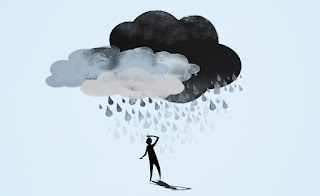Panic Disorder
When I first started
out with my therapist I was pretty blind to what panic disorder was, well along
with everything else I was going through. I simply thought that panic attacks
were a part of having anxiety. I didn't realize there was a whole other being
that made up panic disorder. To help me truly understand what it's like to have
this, my therapist lead me to a site called Centre for Clinical Intervention. This site
has different modules to help you understand your feelings and going through
the panic disorder one was like a light bulb going off in my head. I highly
encourage you to check out this website and go through the modules, especially
if you are someone who suffers from these illnesses. In the meantime, though,
if you don't have time to check out the modules for yourself I want to
summarize some of my favorite takeaways to help better explain what living with
panic disorder is really like.
I think the most
important thing to start off with is giving a better definition of what panic
disorder is. The most common definition is the persistent fear of having a
panic attack. This is what makes it different from general anxiety and panic
attacks. This is getting worked up over a panic attack before it even happens.
I saw this in myself so much. I would avoid situations that I had panicked in
before because I was afraid that I would panic again. It didn't matter that
every day was a new day, I wanted to avoid that situation because I wanted to
avoid having a panic attack. Panic attacks are no fun, so why would I want to
willingly put myself in that situation? I could work myself so much over just
the fear of panicking that I would end up having a panic attack. It's a
lose-lose situation in my opinion. There was never the option of being able to
make it through the situation it was always the fear that if I went through
with this I would have a panic attack.
For those of you who
have never had a panic attack, I'm going to list some of the symptoms so you
can hopefully have a better understanding of why it is something that can cause
so much fear in one's mind.
- Racing/Pounding Heart
- Sweating
- Shaking
- Difficulty breathing/Shortness of breath
- Chest Pain
- Feeling like you're going to faint
- Tingling/numbness
- Drastic body temperature changes
- Feeling detached from your body
- Thoughts of losing control/going crazy
- Fear of dying
So when anywhere
from one to all of these symptoms are occurring in a matter of seconds it has a
lasting effect not only on your body but on your mind.
One of the things
this website talks about to help deal with having panic disorder is the ABC's
and how to analyze them. I found this extremely helpful in looking at a
situation I was truly terrified of, whether past or future, and helping me
understand what I was feeling and hopefully why I was feeling that way.
*Disclaimer*: These
are not my findings they are the findings of the Centre for Clinical Intervention, I do not take
credit for any of these thoughts, I just felt the need to share them.
Analyzing ABC's
A stands for the
activating event. This represents a situation in which you experienced strong
anxiety or panic attack.
Once you have a
situation in mind (it may help to write it down) you can identify the
consequences or the C's. This could be your feelings, physical symptoms, or
actions/behaviors. The goal of this part is to rate the intensity of the
emotion during this situation and choose one that most accurately describes
your feelings during that single experience.
Then you move on to
the B which stands for beliefs. To me this is the hardest part. This is the
self-talk phase to further figure out what you were thinking during this panic
and what you say/said to yourself in response to it. Then after you have a list
of thoughts, you figure out which one matches the core emotion that you felt.
The goal of doing
the ABC's is to discover what thoughts are causing your anxiety in the moment.
Do you truly feel like you can't do something or are you feeling overwhelmed by
the amount of people and your mind is covering that up by telling you that you
can't do it. It's a hard practice and I am still struggling to figure out what
thoughts are the cause of my issues. It takes practice and work but I truly
feel that it can be beneficial, especially in the beginning stages of figuring
out why you feel like you can't breathe all the time.
Have you experienced panic disorder? How do you prepare to cope with possible trigger situations? I would love to hear your thoughts!
Until next time 💜




Comments
Post a Comment